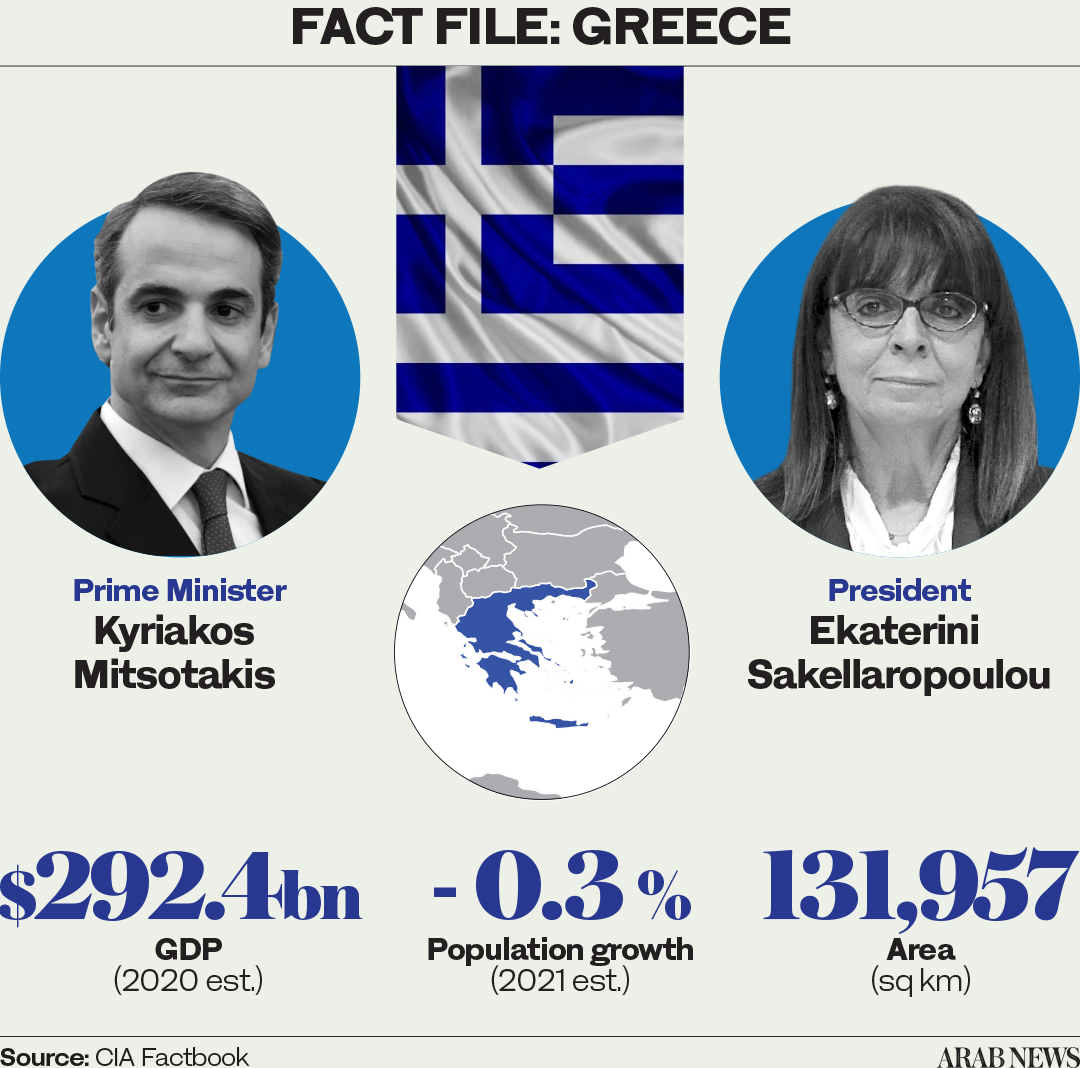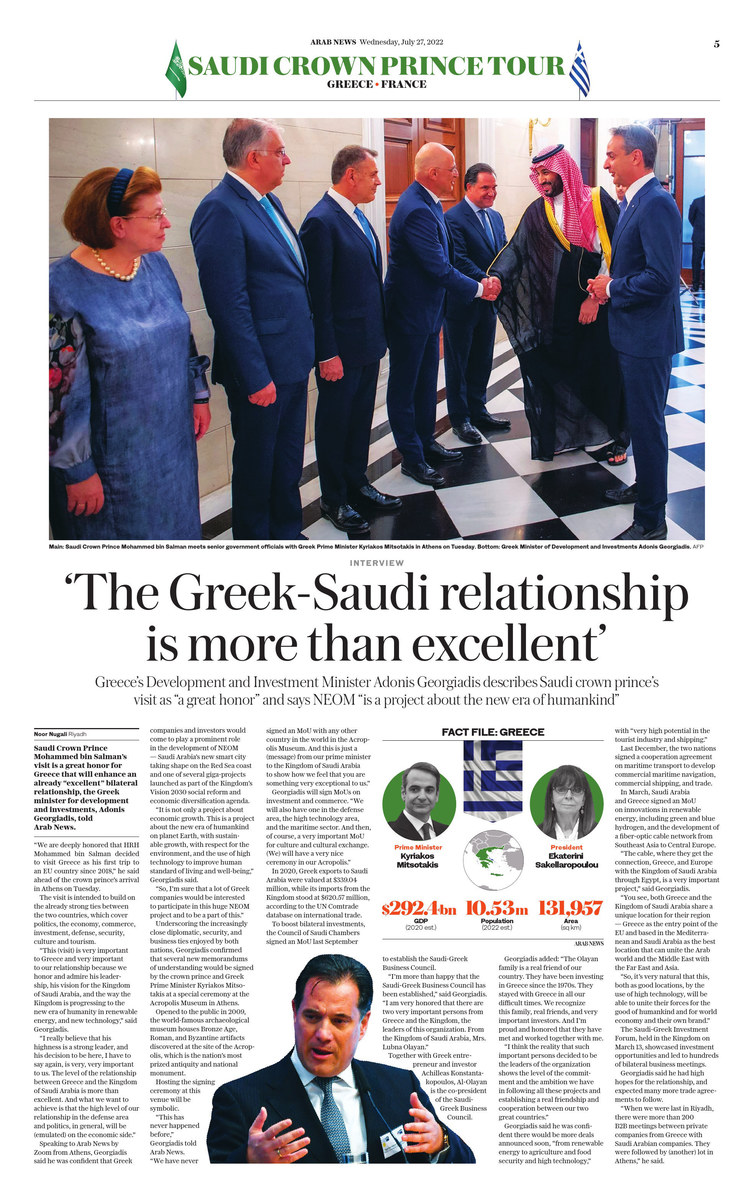RIYADH: Saudi Crown Prince Mohammed bin Salman’s visit is a great honor for Greece that will enhance an already “excellent” bilateral relationship, the Greek minister for development and investments, Adonis Georgiadis, told Arab News.
“We are deeply honored that HRH Mohammed bin Salman decided to visit Greece as his first trip to an EU country since 2018,” he said ahead of the crown prince’s arrival in Athens on Tuesday.
The visit is intended to build on the already strong ties between the two countries, which cover politics, the economy, commerce, investment, defense, security, culture and tourism.
“This (visit) is very important to Greece and very important to our relationship because we honor and admire his leadership, his vision for the Kingdom of Saudi Arabia, and the way the Kingdom is progressing to the new era of humanity in renewable energy, and new technology,” said Georgiadis.
“I really believe that his highness is a strong leader, and his decision to be here, I have to say again, is very, very important to us. The level of the relationship between Greece and the Kingdom of Saudi Arabia is more than excellent. And what we want to achieve is that the high level of our relationship in the defense area and politics, in general, will be (emulated) on the economic side.”
Speaking to Arab News by Zoom from Athens, Georgiadis said he was confident that Greek companies and investors would come to play a prominent role in the development of NEOM — Saudi Arabia’s new smart city taking shape on the Red Sea coast and one of several giga-projects launched as part of the Kingdom’s Vision 2030 social reform and economic diversification agenda.
“It is not only a project about economic growth. This is a project about the new era of humankind on planet Earth, with sustainable growth, with respect for the environment, and the use of high technology to improve human standard of living and wellbeing,” Georgiadis said.
“So, I’m sure that a lot of Greek companies would be interested to participate in this huge NEOM project and to be a part of this.”
Underscoring the increasingly close diplomatic, security, and business ties enjoyed by both nations, Georgiadis confirmed that several new memorandums of understanding would be signed by the crown prince and Greek Prime Minister Kyriakos Mitsotakis at a special ceremony at the Acropolis Museum in Athens.
Opened to the public in 2009, the world-famous archaeological museum houses Bronze Age, Roman, and Byzantine artifacts discovered at the site of the Acropolis, which is the nation’s most prized antiquity and national monument.
Hosting the signing ceremony at this venue will be symbolic.

“This has never happened before,” Georgiadis told Arab News. “We have never signed an MoU with any other country in the world in the Acropolis Museum. And this is just a (message) from our prime minister to the Kingdom of Saudi Arabia to show how we feel that you are something very exceptional to us.”
Georgiadis will sign MoUs on investment and commerce. “We will also have one in the defense area, the high technology area, and the maritime sector. And then, of course, a very important MoU for culture and cultural exchange. (We) Will have a very nice ceremony in our Acropolis.”
In 2020, Greek exports to Saudi Arabia were valued at $339.04 million, while its imports from the Kingdom stood at $620.57 million, according to the UN Comtrade database on international trade.
To boost bilateral investments, the Council of Saudi Chambers signed an MoU last September to establish the Saudi-Greek Business Council.
“I’m more than happy that the Saudi-Greek Business Council has been established,” said Georgiadis. "I am very honored that there are two very important persons from Greece and the Kingdom, the leaders of this organization, from the Kingdom of Saudi Arabia, Mrs. Lubna Olayan.”
Together with Greek entrepreneur and investor Achilleas Konstantakopoulos, Al-Olayan is the co-president of the Saudi-Greek Business Council.
Georgiadis added: “The Olayan family is a real friend of our country. They have been investing in Greece since the 1970s. They stayed with Greece in all our difficult times. We recognize this family, real friends, and very important investors. And I’m proud and honored that they have met and worked together with me.
“I think the reality that such important persons decided to be the leaders of the organization shows the level of the commitment and the ambition we have in following all these projects and establishing a real friendship and cooperation between our two great countries.”
Georgiadis said he was confident there would be many more deals and partnerships announced soon, “from renewable energy to agriculture and food security and high technology,” and that there was “very high potential in the tourist industry and shipping.”
Last December, the two nations signed a cooperation agreement on maritime transport to develop commercial maritime navigation, increase the traffic of commercial ships, and encourage trade.
In March, Saudi Arabia and Greece signed an MoU paving the way for innovations in renewable energy, including green and blue hydrogen, and the development of a fiber-optic cable network that will connect data from Southeast Asia to central Europe.
“The cable, where they get the connection, Greece, and Europe with the Kingdom of Saudi Arabia through Egypt, is a very important project,” said Georgiadis.
“You see, both Greece and the Kingdom of Saudi Arabia share a unique location for their region — Greece as the entry point of the EU and based in the Mediterranean and Saudi Arabia as the best location that can unite the Arab world and the Middle East with the Far East and Asia.
“So, it’s very natural that this, both as good locations, by the use of high technology, will be able to unite their forces for the good of humankind and for world economy and their own brand.”
The Saudi-Greek Investment Forum, held in the Kingdom on March 13, showcased investment opportunities in both countries and resulted in hundreds of bilateral business meetings.
Georgiadis said he had high expectations for the Saudi-Greek relationship in the wake of Crown Prince Mohammed bin Salman’s visit and expected many more trade agreements to follow.
“When we were last in Riyadh, there were more than 200 B2B meetings between private companies from Greece with Saudi Arabia companies. They were followed by (another) lot in Athens,” he said.
“So, you know, the results (of those) are going to come out in 24 hours.”


























